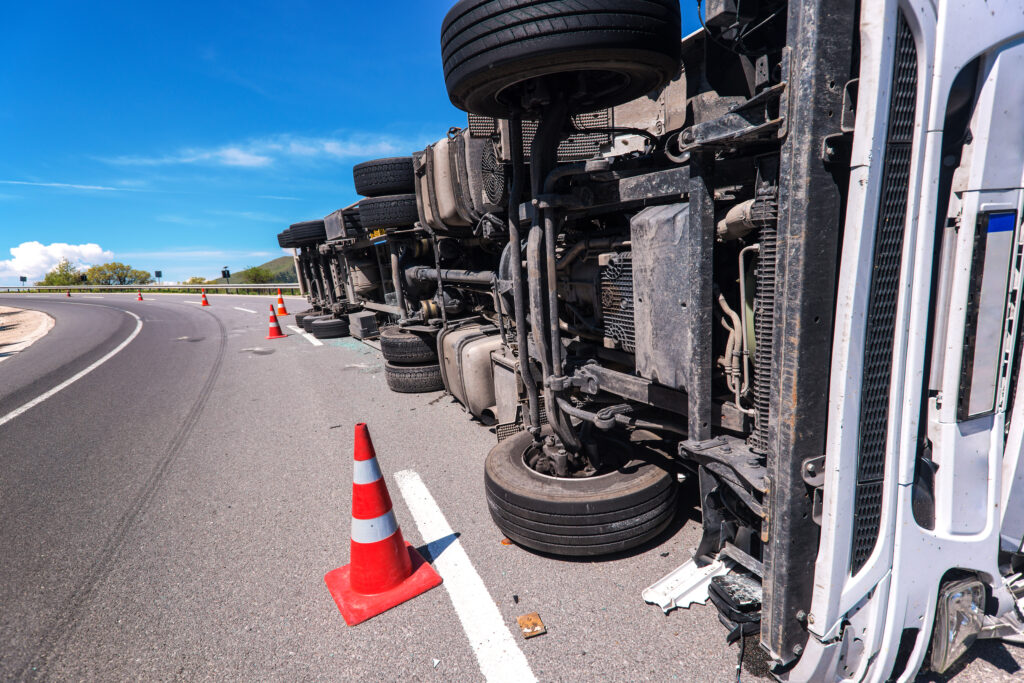
Jackknife accidents are a type of accident specific to semi-trucks and tractor-trailers that occur when the cab and trailer portion of a truck begin moving independently of each other, with the trailer pivoting at the hitch point, creating a 90 degree angle. These types of truck accidents are extremely serious, as they almost always involve multiple vehicles and often, an overturned semi-truck. While there are a lot of different causes for jackknife accidents, most are the result of the combination of a few consistent factors, such as driver error, mechanical failure, and poor weather conditions.
Types of Jackknife Accidents
Jackknife accidents occur when the trailer portion of a semi-truck pushes the cab in another direction, folding at the point where the attached trailer is secured. This can result in a loss of control of the vehicle, as the trailer swings out to block multiple lanes of traffic. In some cases, the momentum may be so extreme that the truck actually rolls over. There are two main jackknifing scenarios, which occur when:
- The tires of the trailer lock up, while the cab continues to move forward, resulting in the tail end of the trailer swinging out sideways; and
- The cab’s tires lock up, leaving the continued momentum of the back trailer to push the truck forward.
In either case, the results of a jackknife accident are often serious, as they almost always involve multiple vehicles. It is also not uncommon for a truck to flip over, spilling any cargo that it may have been carrying into the roadway and the path of other cars.
Common Causes
While there are a lot of factors that can contribute to jackknife accidents, certain problems crop up more than others, including:
- Driving at high speeds, as large commercial trucks are much harder to stop and maneuver and when such attempts are made too abruptly, the tires can lock up;
- Driving too fast around curves, with more severe angles proving to be especially difficult for long trailers to maneuver;
- Attempting to brake abruptly while turning, which is why these actions should always be attempted independently of each other;
- Driving with an unstable trailer load that hasn’t been balanced or secured properly, which can lead to trailer sway and a whipping motion when speed increases too much;
- Driving with an empty trailer, which is known as deadheading and can lead to reduced traction and a loss of control if attempts to brake suddenly are made;
- A blown tire, which can cause a driver to lose control of the truck;
- A mechanical defect, such as hydraulic failure, a problem with the steering system, or a defective brake system, which can cause a truck to sway and tip over;
- Driving errors, like falling asleep at the wheel, driving while distracted, or speeding; and
- Environmental factors, such as slippery or wet roads, which can result in road traction loss and the shifting of weight loads.
When these kinds of issues contribute to or cause a jackknife accident, injured parties could seek compensation from the at-fault parties, which could include the driver of the truck, the trucking company itself, or even a vehicle parts manufacturer.
Responsibility for Jackknife Accidents
Who can be held liable for a jackknife accident will depend largely on the cause of the crash in question. For instance, if it turns out that a blown tire or mechanical defect caused a jackknife accident, the trucking company responsible for the vehicle’s upkeep could be held liable for the crash if there is evidence that the truck was in violation of federal regulations. Trucking companies are supposed to ensure that their drivers conduct pre-trip, in-transit, and post-trip inspections. These regular inspections are in addition to the annual inspections that must be conducted by a certified inspector every year. Trucking companies that are found in violation of these requirements could be required to compensate an accident victim if it is determined that a defect was the cause of a crash. Similarly, a trucking company that failed to ensure that its cargoes were loaded properly or its drivers qualified and carefully trained could be held liable for resulting jackknife accidents. Other potentially liable parties include:
- The truck’s driver;
- Other drivers on the road who contributed to the accident;
- The company responsible for loading the cargo;
- A negligent mechanic or inspector; or
- A vehicle parts manufacturer.
For help determining the cause of your own jackknife accident, reach out to our legal team today.
Contacting a Truck Accident Lawyer
Call Dolan Dobrinsky Rosenblum Bluestein at 305-371-2692 to set up a free consultation with one of our skilled and experienced Miami truck accident lawyers. You can also reach us via online message.